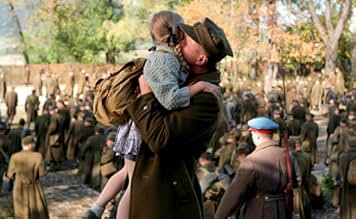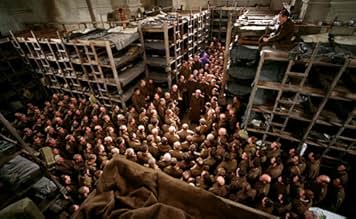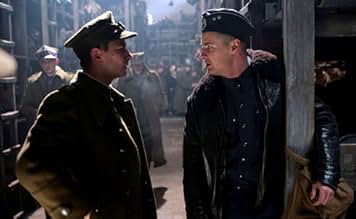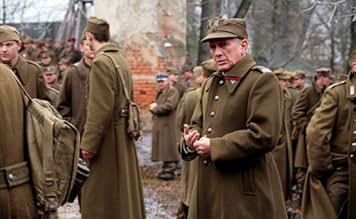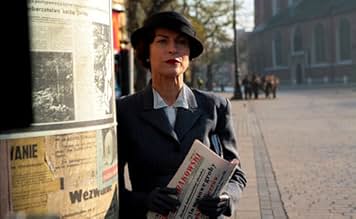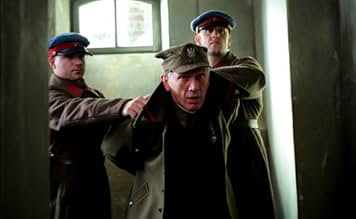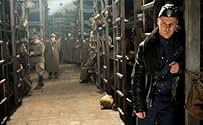PUNTUACIÓN EN IMDb
7,0/10
18 mil
TU PUNTUACIÓN
Añade un argumento en tu idiomaAn examination of the Soviet slaughter of thousands of Polish officers and citizens in the Katyn forest in 1940.An examination of the Soviet slaughter of thousands of Polish officers and citizens in the Katyn forest in 1940.An examination of the Soviet slaughter of thousands of Polish officers and citizens in the Katyn forest in 1940.
- Dirección
- Guión
- Reparto principal
- Nominado para 1 premio Óscar
- 14 premios y 14 nominaciones en total
Joachim Paul Assböck
- Obersturmbannführer Bruno Müller
- (as Joachim Assböck)
Reseñas destacadas
A well done picture speaking for those who cannot speak for themselves and would be gladly considered never existing by some.
Although it's difficult to credibly and adequately convey the horror of such a murder which became a life tragedy for many Polish families and undoubtedly affected the way Poland looked after the war I think the director made a good job. Especially so, that it happened to be his personal tragedy as well.
Despite that the movie is well-balanced with emotions and atmosphere. Modest colors and anxious music by Penderecki emphasize the horror of those who were waiting. Short cuts of brutal scenes of murder leave speechless. No additional comment is needed.
Although it's difficult to credibly and adequately convey the horror of such a murder which became a life tragedy for many Polish families and undoubtedly affected the way Poland looked after the war I think the director made a good job. Especially so, that it happened to be his personal tragedy as well.
Despite that the movie is well-balanced with emotions and atmosphere. Modest colors and anxious music by Penderecki emphasize the horror of those who were waiting. Short cuts of brutal scenes of murder leave speechless. No additional comment is needed.
Katyn by Andrzej Wajda
A courageous film by a director who makes no concessions. Austerity instead of high-tech. What cineast of hallucinatory action, of nude and crude sensuality, of sequences full of monumental catastrophes would make a film in which one had scenes in a slower rhythm, without sex, with shadowy photography, with quiet music and giving ethical principles priority over the characters and their lives.
One more reason, however, for us to thank Hollywood for nominating this film to run for the Oscar for the best foreign film.
The Katyn massacre, perpetrated on Stalin's orders to eliminate the fine flower of the Polish intelligentsia, was left out of official Soviet history until the glasnost of Gorbatchov. There, in the Katyn forest and in other places as well, thousands of Polish officers were massacred. The Soviets tried to attribute it to the Nazis, but the truth eventually came to light. There is still, however, in Russia today, an attempt to deny the historical truth.
I would like to make my own the reading of the film which focuses on this question of the distortion of historical fact by the apparatus of the state. The official lie imposed by the Soviet occupation of Poland brought torment to the lives of many of the families of the victims. Wajda's denunciation, along with the cry "Never kill again!" can also serve as an alert for our present world, in which so often a virtual reality becomes a substitute for the truth.
The first group of interpretations belong to the women (wives, mothers, daughters) of the dead officers: how they coped, first with the hope of their return, and then with the definitive notice of their loss. They are marvellous interpretations, revealing the director's mastery and the talent of the actors. The portrayals demonstrate how, even when nothing else is left, there is still dignity. The wife of the dead General in Katyn refuses to endorse a declaration, prepared by the Nazis, denouncing the Soviets. The truth was known why, then, should she play Hitler's propaganda game? He was just as much the enemy as Stalin was. Another woman wants to honour the memory of her brother by putting on the family tomb a stone with his name on it. Courageously she challenges the regime, but in vain - the stone is destroyed because on it the date of the officer's death indicates clearly who is to blame.
Most of the male characters were simply victims of massacre; among those who had the opportunity of showing themselves authentically noble was a Russian officer who tried to save his Polish neighbour and her daughter. "I couldn't save my own family but I can help yours." And it is a Polish officer who has changed sides who represents, in the middle of so much heroism, the weakness of some. "It is necessary to survive," he declared.
An entire population was suffocated by the Nazi and Soviet occupation. It is a shock to be shown in the film the cordial relations between the officials of the occupying powers, which would have been inconceivable in earlier years. Poland is partitioned (yet again!) by the Molotov-Ribbentrop pact. In the Poland occupied by the Nazis all the professors of a university are summoned and arrested there and then (as a means of impeding the formation of future opposition). In the Poland occupied by the Soviets, the Polish officers are made prisoners of war (an efficient means of stopping them fighting for the independence of their country).
Pawel Edelman's photography is simply a work of genius, a mixture of sombre realism and the surreal. The music of Krzystof Penderecki fits the narrative like a glove, producing just the right atmosphere at the right time. The dry narrative style has something in common with a documentary and calls to mind another of his films, Love in Germany. And there is no lack of the symbolism present in all his films, this time with a remarkably religious tone.
In the development of the story there are moments taken from the films of that period as, for example, the powerful exhumation of the dead, scenes which served Soviets and Nazis alike in placing the blame on each other.
For me the strongest images are those of the young man who refused to declare that his father had not been killed in Katyn by the Soviets; of the two waves of fugitives running in opposite directions and meeting in the middle of a bridge which way to run? of the general who tried to animate his men in the last Christmas of their lives and of the little girl awaiting the return of her father. This last touched me in a special way, because I too had waited for my father's return at the end of the war.
Katyn is, without doubt, one of Andrzej Wajda's greatest films.
Tomasz Lychowski Rio de Janeiro, Brazil February, 2008.
Translated into English by Graham Connell
A courageous film by a director who makes no concessions. Austerity instead of high-tech. What cineast of hallucinatory action, of nude and crude sensuality, of sequences full of monumental catastrophes would make a film in which one had scenes in a slower rhythm, without sex, with shadowy photography, with quiet music and giving ethical principles priority over the characters and their lives.
One more reason, however, for us to thank Hollywood for nominating this film to run for the Oscar for the best foreign film.
The Katyn massacre, perpetrated on Stalin's orders to eliminate the fine flower of the Polish intelligentsia, was left out of official Soviet history until the glasnost of Gorbatchov. There, in the Katyn forest and in other places as well, thousands of Polish officers were massacred. The Soviets tried to attribute it to the Nazis, but the truth eventually came to light. There is still, however, in Russia today, an attempt to deny the historical truth.
I would like to make my own the reading of the film which focuses on this question of the distortion of historical fact by the apparatus of the state. The official lie imposed by the Soviet occupation of Poland brought torment to the lives of many of the families of the victims. Wajda's denunciation, along with the cry "Never kill again!" can also serve as an alert for our present world, in which so often a virtual reality becomes a substitute for the truth.
The first group of interpretations belong to the women (wives, mothers, daughters) of the dead officers: how they coped, first with the hope of their return, and then with the definitive notice of their loss. They are marvellous interpretations, revealing the director's mastery and the talent of the actors. The portrayals demonstrate how, even when nothing else is left, there is still dignity. The wife of the dead General in Katyn refuses to endorse a declaration, prepared by the Nazis, denouncing the Soviets. The truth was known why, then, should she play Hitler's propaganda game? He was just as much the enemy as Stalin was. Another woman wants to honour the memory of her brother by putting on the family tomb a stone with his name on it. Courageously she challenges the regime, but in vain - the stone is destroyed because on it the date of the officer's death indicates clearly who is to blame.
Most of the male characters were simply victims of massacre; among those who had the opportunity of showing themselves authentically noble was a Russian officer who tried to save his Polish neighbour and her daughter. "I couldn't save my own family but I can help yours." And it is a Polish officer who has changed sides who represents, in the middle of so much heroism, the weakness of some. "It is necessary to survive," he declared.
An entire population was suffocated by the Nazi and Soviet occupation. It is a shock to be shown in the film the cordial relations between the officials of the occupying powers, which would have been inconceivable in earlier years. Poland is partitioned (yet again!) by the Molotov-Ribbentrop pact. In the Poland occupied by the Nazis all the professors of a university are summoned and arrested there and then (as a means of impeding the formation of future opposition). In the Poland occupied by the Soviets, the Polish officers are made prisoners of war (an efficient means of stopping them fighting for the independence of their country).
Pawel Edelman's photography is simply a work of genius, a mixture of sombre realism and the surreal. The music of Krzystof Penderecki fits the narrative like a glove, producing just the right atmosphere at the right time. The dry narrative style has something in common with a documentary and calls to mind another of his films, Love in Germany. And there is no lack of the symbolism present in all his films, this time with a remarkably religious tone.
In the development of the story there are moments taken from the films of that period as, for example, the powerful exhumation of the dead, scenes which served Soviets and Nazis alike in placing the blame on each other.
For me the strongest images are those of the young man who refused to declare that his father had not been killed in Katyn by the Soviets; of the two waves of fugitives running in opposite directions and meeting in the middle of a bridge which way to run? of the general who tried to animate his men in the last Christmas of their lives and of the little girl awaiting the return of her father. This last touched me in a special way, because I too had waited for my father's return at the end of the war.
Katyn is, without doubt, one of Andrzej Wajda's greatest films.
Tomasz Lychowski Rio de Janeiro, Brazil February, 2008.
Translated into English by Graham Connell
This excellent movie is a vivid portrayal about war. War has rarely been rendered in such an horrid, utterly grim manner, especially in its final part. Harrowing, unnerving epic which depicts the horror of war as a woman named Anna (Maja) roams the Russian detachments to find his prisoner husband (Arthur Zmijewski) during invasion and other stories. As Anna , her daughter and mother-in-law live in hopes which the father has survived . As a general's (Jan Eglert) wife keeps silence when a Russian officer obligate her to accuse the Germans of her husband's death. Furthermore the Anna's nephew whose father was killed at Katynn is pursued by Russian military for defacing an advertisement cartel . The story contains some overwhelming sequences as the massacre across the Katyn wood and including some actual documentary. It packs a sensible and spectacular musical score by the classic musician Krzystof Penderecki. Evocative and colorful cinematography by Pawel Edelman, usual of Roman Polanki and Wadja. The motion picture has splendidly been directed by the veteran Andrzej Wadja, the best Polish director who made classics as ¨Pan Tadeusz, Danton, The promised land, Kanal¨ among others.
The historic events in which this movie are based result to be the following : Hitler wanted to avoid facing a possible alliance of the Soviet Union , Britain and France. The Western democracies were equally aware of the Soviets' potential to deter German expansion but their negotiations with Stalin did not lead to any agreement. At the same time, however, Hitler had set aside his ideological differences with Stalin in the hopes of making an alliance. In August 1939 he offered Stalin a deal : If the Soviets allowed Germany to attack Western Poland , they would receive eastern Poland and Baltic states. The Munich capitulation of France and Britain to Hitler's demands convinced that they would be unreliable allies . He decided that he had to cope with German expansion eastward on his own, without their help. In late August 1939, German foreign Secretary Joachin Von Ribentropp visited Moscow to sign with Molotov a German-Soviet Nonagression Pact , which included the deal over territory. The agreement between two nations at opposite political extremes, fascism on one side , communism on the other, shocked the world. It also left Hitler with a free hand in Poland. Hitler used an apparent Polish raid on a Radio Station in the German border town of Gleiwitz as an excuse to invade Poland the following day , September 1, 1939. Two days later, on September 3, France and Britain declared war on Germany, WWII had begun. Beaten back by the Germans, Polish forces were now attacked from the east. The Soviet dictator Joseph Stalin ordered his Red Army to cross into eastern Poland. He claimed that he wanted to prevent anarchy caused by the collapse of Polish government. Thousands of Soviet troops poured across the border and raced west to link up with German troops. Organized Polish resistance to the invaders collapsed. In the last week of September Polish troops in Modlin and Warsaw surrounded to the Germans, A small garrison of 4.500 men held out on the Hel Peninsula near Danzing until October 2. Some 694.000 Polish were seized by the victorious Germans and more than 217.000 Poles were rounded up by the Red Army. Both the Germans and Soviets treated the Poles with great brutality. Stalin ordered most of his prisoners deported to the Gulag (a system brutal labor camps) and later taking more than 20.000 officer prisoners were executed in secret.
The historic events in which this movie are based result to be the following : Hitler wanted to avoid facing a possible alliance of the Soviet Union , Britain and France. The Western democracies were equally aware of the Soviets' potential to deter German expansion but their negotiations with Stalin did not lead to any agreement. At the same time, however, Hitler had set aside his ideological differences with Stalin in the hopes of making an alliance. In August 1939 he offered Stalin a deal : If the Soviets allowed Germany to attack Western Poland , they would receive eastern Poland and Baltic states. The Munich capitulation of France and Britain to Hitler's demands convinced that they would be unreliable allies . He decided that he had to cope with German expansion eastward on his own, without their help. In late August 1939, German foreign Secretary Joachin Von Ribentropp visited Moscow to sign with Molotov a German-Soviet Nonagression Pact , which included the deal over territory. The agreement between two nations at opposite political extremes, fascism on one side , communism on the other, shocked the world. It also left Hitler with a free hand in Poland. Hitler used an apparent Polish raid on a Radio Station in the German border town of Gleiwitz as an excuse to invade Poland the following day , September 1, 1939. Two days later, on September 3, France and Britain declared war on Germany, WWII had begun. Beaten back by the Germans, Polish forces were now attacked from the east. The Soviet dictator Joseph Stalin ordered his Red Army to cross into eastern Poland. He claimed that he wanted to prevent anarchy caused by the collapse of Polish government. Thousands of Soviet troops poured across the border and raced west to link up with German troops. Organized Polish resistance to the invaders collapsed. In the last week of September Polish troops in Modlin and Warsaw surrounded to the Germans, A small garrison of 4.500 men held out on the Hel Peninsula near Danzing until October 2. Some 694.000 Polish were seized by the victorious Germans and more than 217.000 Poles were rounded up by the Red Army. Both the Germans and Soviets treated the Poles with great brutality. Stalin ordered most of his prisoners deported to the Gulag (a system brutal labor camps) and later taking more than 20.000 officer prisoners were executed in secret.
An estimated minimum of 3 million Poles were killed by the Stalinist regime; but as Stalin observed "When one person dies it's a tragedy; when a million people die it's a statistic".
The scope of these activities would be considered genocide, if that term was used to describe political and social, as well as racial and religious populations.
So - less "statistically"- mothers, fathers, brothers, sisters, kids, and friends were murdered for the political ends of those who now wish to remain faceless and unknown. It is critical, if we are to emerge as a humane people, that the unknown and faceless multitudes of both victims and their oppressors and killers, be reveled. This movie perhaps, is the first step in that direction.
The scope of these activities would be considered genocide, if that term was used to describe political and social, as well as racial and religious populations.
So - less "statistically"- mothers, fathers, brothers, sisters, kids, and friends were murdered for the political ends of those who now wish to remain faceless and unknown. It is critical, if we are to emerge as a humane people, that the unknown and faceless multitudes of both victims and their oppressors and killers, be reveled. This movie perhaps, is the first step in that direction.
Are there words to express suffering, injustice, hypocrisy of war? May empathy ease the pain of those who lost hope for a better world?
There are many movies on WWII that appear to be more or less captivating, touching as well as educational. And, in this respect, we could easily rate this movie in that way if we treat KATYN as yet another film on WWII. However, the case here is different, more to say exceptionally unique.
Andrzej Wajda, after 18 years since the downfall of communist regime, fulfills the duty he feels to his parents and all Polish Patriots and makes a film on the theme that, not long ago, was not only forbidden to discuss in theater or cinema, but in all public places, the Truth that was prohibited and highly unwelcome, the Truth about the slaughter of more than 20,000 Polish best officers committed by Soviet communists in the forests of Katyn. Andrzej Wajda based his film on Andrzej Mularczyk's story POST MORTEM and consulted great Katyn witnesses, including recently deceased Priest Zdzislaw Peszkowski (1918-2007). If the film is good or weak belongs to the opinions of particular viewers. But lots of people on the premiere day stated that it's a historic work. Why?
KATYN, though a movie, is a wonderful documentary that supplies the viewer with TRUTHFUL information on what really happened in 1940, why it happened and who did this (facts that were most distorted in many historical books and many other sources for years). Here, the truth is more important than anything else. The movie contains archive footage, pictures and terrific narrator. These moments are well balanced and, though appearing several times, do not disturb anything but make for all the rest. And what is the rest?
The rest contains particularly vivid plots of families, their dreams, their fear, husbands/sons' honor, wives' love and care, and foremost young officers' martyrdom. The story of Andrzej (Artur Zmijewski) is exceptionally moving. His situation seems to represent the Poland of that time: torn between two oppressors, two worlds: Nazi Germany who attacked it on September, the 1st, 1939 and communist Russia who attacked it from the east 17 days later. As a victim of Katyn massacre, Andrzej appears to tell us a tragic story of separation, extreme suffering, but hope, to the very last day, the hope for survival. His notebook seems to tell us: "No, I will live, they're taking us somewhere but I'll surely see my beloved woman, my loving mum and my sweet daughter." The tragic though full of hope Christmas Eve also depicts that attitude. Other characters, including Jerzy (Andrzej Chyra), Andrzej's wife Anna (Maja Ostaszewska), General's wife (Danuta Stenka) constitute a brilliant insight into various, usually helpless, reactions towards evil, hypocrisy, injustice, cruelty and neutrality.
These stories are executed in an accurate and universal way. In such historic but tragic content, there is usually a tendency to become either too preachy or too emotional, which, to some extend, jerk the tears from viewers' eyes by force. Wajda does not do anything of these. He remains with the people, with humanity in general, does not give the final answer to anything. He seems to be with all of us and appears to depict a quest for truth, quest for justice and for humanity. Besides, he uses lots of very accurate symbols. The unforgettable and probably most thought provoking symbol is when Andrzej's wife looks for her husband and uncovers the bodies of soldiers. Among them, she occurs to uncover the figure of Christ taken from the Cross in church and laid among the deceased. Haven't we killed God by losing respect for life? Another brilliant symbol is when Russian soldiers tear the Polish flag into two parts, hanging the red part again as the Russian flag and using the white part as a foot dressing.
Except for the factors described above, KATYN is also a wonderful piece of work as a film. Very good cinematography, moody atmosphere, flawless performances. Artur Zmijewski does a brilliant job as Andrzej, Maja Ostaszewska is genuine as his wife and heroic, in a sense, Maja Komorowska is again a real artist in her job giving a real portrayal of the caring and then mourning mother. And Andrzej Chyra as Jerzy whose conscience and solidarity do not allow him to go on...magnificent!
But at the end I must tell you that it was not easy for me to write this review. The stories like this one do not lead to wordy comments, much noise, opinions, praise or criticism. They call for silence, the sacred silence that lets us honor those who died in such inhumane way. This silence shall constitute a significant message for today's generation, shall help us see deeper and give us faith to believe that their lives did not end in the soil. Therefore, though difficult, I consider KATYN one of the most important movies I have seen in my life.
Yes, dear young Patriot, hold Your Rosary high. The world will probably call your act "the act of despair". Yet, the world is befriended with lie and you are now victorious in a world of Glory and Eternal Light where there is no room for "lie". R.I.P.
There are many movies on WWII that appear to be more or less captivating, touching as well as educational. And, in this respect, we could easily rate this movie in that way if we treat KATYN as yet another film on WWII. However, the case here is different, more to say exceptionally unique.
Andrzej Wajda, after 18 years since the downfall of communist regime, fulfills the duty he feels to his parents and all Polish Patriots and makes a film on the theme that, not long ago, was not only forbidden to discuss in theater or cinema, but in all public places, the Truth that was prohibited and highly unwelcome, the Truth about the slaughter of more than 20,000 Polish best officers committed by Soviet communists in the forests of Katyn. Andrzej Wajda based his film on Andrzej Mularczyk's story POST MORTEM and consulted great Katyn witnesses, including recently deceased Priest Zdzislaw Peszkowski (1918-2007). If the film is good or weak belongs to the opinions of particular viewers. But lots of people on the premiere day stated that it's a historic work. Why?
KATYN, though a movie, is a wonderful documentary that supplies the viewer with TRUTHFUL information on what really happened in 1940, why it happened and who did this (facts that were most distorted in many historical books and many other sources for years). Here, the truth is more important than anything else. The movie contains archive footage, pictures and terrific narrator. These moments are well balanced and, though appearing several times, do not disturb anything but make for all the rest. And what is the rest?
The rest contains particularly vivid plots of families, their dreams, their fear, husbands/sons' honor, wives' love and care, and foremost young officers' martyrdom. The story of Andrzej (Artur Zmijewski) is exceptionally moving. His situation seems to represent the Poland of that time: torn between two oppressors, two worlds: Nazi Germany who attacked it on September, the 1st, 1939 and communist Russia who attacked it from the east 17 days later. As a victim of Katyn massacre, Andrzej appears to tell us a tragic story of separation, extreme suffering, but hope, to the very last day, the hope for survival. His notebook seems to tell us: "No, I will live, they're taking us somewhere but I'll surely see my beloved woman, my loving mum and my sweet daughter." The tragic though full of hope Christmas Eve also depicts that attitude. Other characters, including Jerzy (Andrzej Chyra), Andrzej's wife Anna (Maja Ostaszewska), General's wife (Danuta Stenka) constitute a brilliant insight into various, usually helpless, reactions towards evil, hypocrisy, injustice, cruelty and neutrality.
These stories are executed in an accurate and universal way. In such historic but tragic content, there is usually a tendency to become either too preachy or too emotional, which, to some extend, jerk the tears from viewers' eyes by force. Wajda does not do anything of these. He remains with the people, with humanity in general, does not give the final answer to anything. He seems to be with all of us and appears to depict a quest for truth, quest for justice and for humanity. Besides, he uses lots of very accurate symbols. The unforgettable and probably most thought provoking symbol is when Andrzej's wife looks for her husband and uncovers the bodies of soldiers. Among them, she occurs to uncover the figure of Christ taken from the Cross in church and laid among the deceased. Haven't we killed God by losing respect for life? Another brilliant symbol is when Russian soldiers tear the Polish flag into two parts, hanging the red part again as the Russian flag and using the white part as a foot dressing.
Except for the factors described above, KATYN is also a wonderful piece of work as a film. Very good cinematography, moody atmosphere, flawless performances. Artur Zmijewski does a brilliant job as Andrzej, Maja Ostaszewska is genuine as his wife and heroic, in a sense, Maja Komorowska is again a real artist in her job giving a real portrayal of the caring and then mourning mother. And Andrzej Chyra as Jerzy whose conscience and solidarity do not allow him to go on...magnificent!
But at the end I must tell you that it was not easy for me to write this review. The stories like this one do not lead to wordy comments, much noise, opinions, praise or criticism. They call for silence, the sacred silence that lets us honor those who died in such inhumane way. This silence shall constitute a significant message for today's generation, shall help us see deeper and give us faith to believe that their lives did not end in the soil. Therefore, though difficult, I consider KATYN one of the most important movies I have seen in my life.
Yes, dear young Patriot, hold Your Rosary high. The world will probably call your act "the act of despair". Yet, the world is befriended with lie and you are now victorious in a world of Glory and Eternal Light where there is no room for "lie". R.I.P.
¿Sabías que...?
- CuriosidadesThe director's father was killed in this massacre. Andrzej Wajda was only 13 years old then. His father's remains were never found.
- PifiasTur says to Ewa, "Haven't you seen that Disney's "The Sleeping Beauty", remember?" That movie was first released fourteen years after 1945, so this may be a mistranslation in the subtitles for "Snow White".
- ConexionesFeatured in The 80th Annual Academy Awards (2008)
- Banda sonoraPolish Requiem For 4 Solo Voices, Choir And Orchestra
Written by Krzysztof Penderecki
Performed by Polish State Philharmonic Orchestra
Selecciones populares
Inicia sesión para calificar y añadir a tu lista para recibir recomendaciones personalizadas
- How long is Katyn?Con tecnología de Alexa
Detalles
- Fecha de lanzamiento
- País de origen
- Sitio oficial
- Idiomas
- Títulos en diferentes países
- Катинь
- Localizaciones del rodaje
- Empresas productoras
- Ver más compañías en los créditos en IMDbPro
Taquilla
- Presupuesto
- 4.000.000 € (estimación)
- Recaudación en Estados Unidos y Canadá
- 118.095 US$
- Fin de semana de estreno en EE. UU. y Canadá
- 11.053 US$
- 22 feb 2009
- Recaudación en todo el mundo
- 14.768.451 US$
- Duración2 horas 2 minutos
- Color
- Mezcla de sonido
- Relación de aspecto
- 2.35 : 1
Contribuir a esta página
Sugerir un cambio o añadir el contenido que falta


